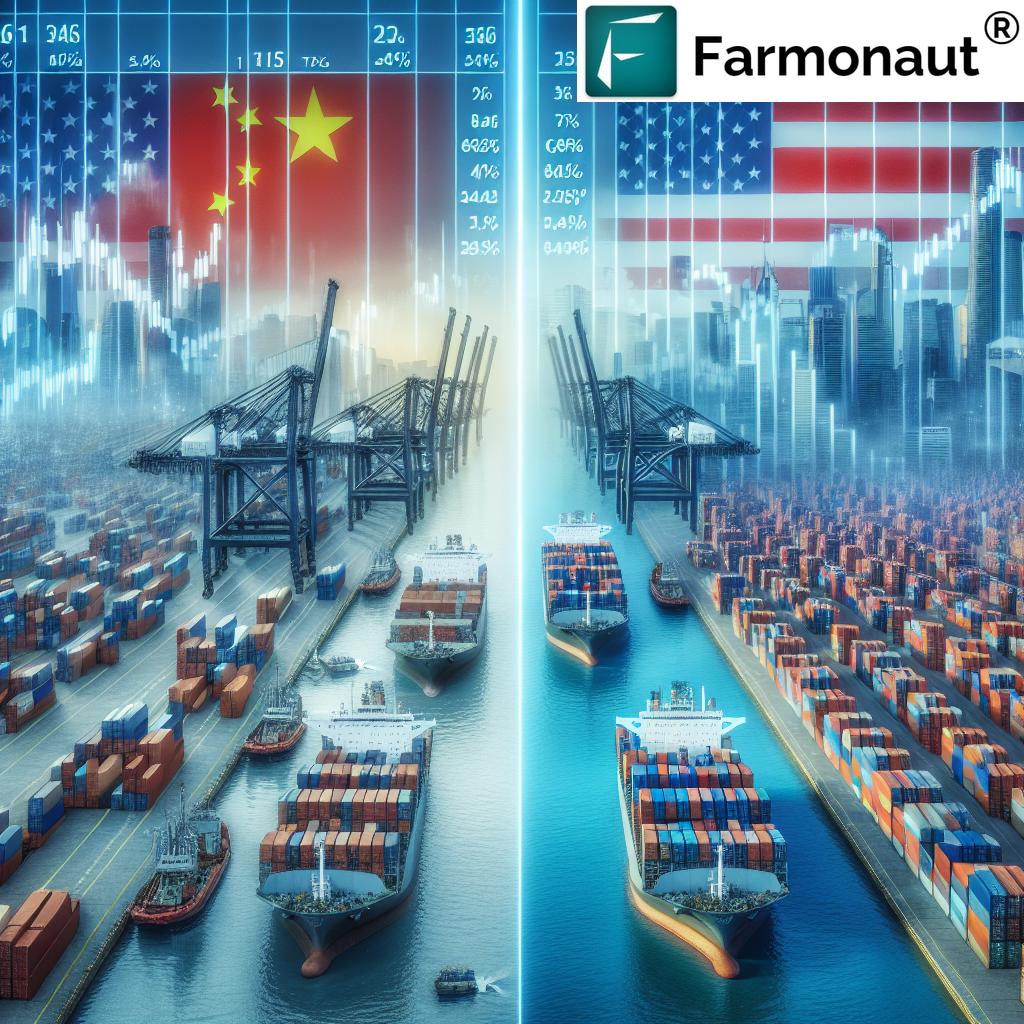Global Trade Tensions Escalate: US-China Tariff War and North American Trade Developments
“The US-China tariff war affected over $360 billion worth of goods, impacting global trade dynamics and supply chains.”
In the ever-evolving landscape of international trade, we find ourselves at a critical juncture as US-China trade tensions escalate to unprecedented levels. The global economic stage is witnessing a complex interplay of tariffs, negotiations, and strategic maneuvers that are reshaping the future of commerce. As representatives of Farmonaut, a company dedicated to revolutionizing agriculture through satellite-based farm management solutions, we recognize the profound implications these trade disputes have on the agricultural sector and beyond.
Today, we delve deep into the intricate web of global trade relations, focusing on the tariff war between the United States and China, while also examining significant developments in North American trade. Our analysis will provide valuable insights into the current state of affairs and potential future scenarios that could impact industries worldwide.
The US-China Tariff War: A Closer Look
At the heart of the current global trade tensions lies the escalating tariff war between the world’s two largest economies: the United States and China. This conflict has sent ripples through international markets, affecting everything from agricultural machinery to high-tech electronics.
The latest chapter in this ongoing saga involves China’s announcement of retaliatory tariffs on various US imports. Specifically, Beijing has imposed a 15% tariff on coal and liquefied natural gas (LNG), alongside a 10% tariff on additional products, including crude oil and agricultural machinery. These moves are a direct response to the US’s own implementation of tariffs on Chinese goods.

China’s Ministry of Finance has been vocal in its criticism, asserting that the US tariffs violate World Trade Organization rules and undermine economic cooperation between the two nations. This stance highlights the delicate balance between national interests and international trade norms that both countries are attempting to navigate.
Strategic Timing and Measured Responses
One of the most intriguing aspects of China’s recent tariff announcement is its strategic timing. Prof. Julien Chaisse of City University of Hong Kong offers valuable insights into Beijing’s approach:
“China’s new tariffs appear to serve as a measured response rather than a dramatic escalation. The February 10 start date for the tariffs is a strategic move that allows room for negotiation post Trump-Xi discussion, suggesting an opportunity for potential adjustments or compromises that may alleviate rising tensions.”
This calculated approach demonstrates China’s willingness to engage in dialogue while also protecting its economic interests. However, the success of this strategy hinges on the US’s interpretation and subsequent actions. As Prof. Chaisse warns, the Trump administration’s response will be critical in determining whether we see a de-escalation through dialogue or a further intensification of trade restrictions.
Impact on Key Industries
The tariff war has far-reaching consequences across various sectors, with some industries feeling the impact more acutely than others. Let’s examine the potential effects on key areas:
LNG and Crude Oil Markets
The imposition of tariffs on LNG and crude oil imports from the US could have significant implications for global energy markets. China, as one of the world’s largest energy consumers, plays a crucial role in shaping demand. The 15% tariff on LNG and 10% tariff on crude oil may lead to:
- Reduced US exports to China
- Potential price fluctuations in global energy markets
- Shifts in supply chains as Chinese buyers seek alternative sources
For companies involved in energy trading or those heavily reliant on these resources, staying informed about these developments is crucial for making strategic decisions.
Agricultural Sector
The agricultural industry, already sensitive to trade fluctuations, faces new challenges with the latest round of tariffs. The 10% tariff on agricultural machinery imports from the US could lead to:
- Increased costs for Chinese farmers looking to modernize their operations
- Potential slowdown in agricultural modernization efforts in China
- Opportunities for non-US manufacturers of agricultural equipment
At Farmonaut, we understand the importance of efficient farming practices and the role of technology in agriculture. Our satellite-based farm management solutions can help farmers optimize their operations, even in the face of challenging economic conditions. By leveraging our API and mobile apps, farmers can make data-driven decisions to improve productivity and reduce costs.
North American Trade Developments
While the US-China trade war dominates headlines, significant developments are also unfolding closer to home in North America. Recent announcements by Mexican President Claudia Sheinbaum and Canadian Prime Minister Justin Trudeau highlight the interconnected nature of global trade relations.
“North American trade negotiations involved revising a trilateral agreement worth over $1.2 trillion in annual trade between the US, Mexico, and Canada.”
The 30-day suspension on US tariffs following cooperative agreements with President Trump marks a positive step in addressing regional concerns. This initiative focuses on tackling issues such as drug trafficking and undocumented migration, emphasizing collaboration between the United States and its North American neighbors.
These developments underscore the importance of regional partnerships in navigating global trade challenges. For businesses operating within North America, this temporary tariff suspension could provide a window of opportunity for strategic planning and potential market adjustments.
Unexpected Geopolitical Interactions: The El Salvador Proposal
In an unexpected turn of events, El Salvador’s President Nayib Bukele has made a striking proposal that intersects with the broader narrative of international relations and trade. During US Secretary of State Marco Rubio’s visit to the country, President Bukele offered to accept convicted criminals from the United States, proposing to outsource part of the US prison population to El Salvador’s mega-prison system (CECOT) for a fee.
While this proposal may seem tangential to trade discussions, it highlights the complex and often surprising ways in which international relations and economic considerations intersect. The offer aims to address US prison overcrowding issues while providing financial benefits to El Salvador, demonstrating how countries seek creative solutions to domestic challenges through international cooperation.
The Role of Technology in Navigating Trade Challenges
As the global trade landscape becomes increasingly complex, the role of technology in helping businesses adapt and thrive cannot be overstated. At Farmonaut, we believe that innovative solutions are key to overcoming challenges in the agricultural sector and beyond.
Our satellite-based crop health monitoring system provides farmers with real-time insights into vegetation health, soil moisture levels, and other critical metrics. This data-driven approach enables farmers to make informed decisions about irrigation, fertilizer usage, and pest management, optimizing crop yields and reducing resource wastage.
In the context of trade tensions and changing market dynamics, such technological solutions become even more valuable. By improving efficiency and productivity, farmers can better position themselves to weather economic uncertainties and adapt to shifting global supply chains.
Implications for World Trade Organization Rules
The ongoing trade disputes between the US and China raise important questions about the role and effectiveness of the World Trade Organization (WTO) in governing international trade. Both countries have accused each other of violating WTO rules, highlighting the challenges faced by this global body in mediating complex trade conflicts.
Key considerations regarding the WTO’s involvement include:
- The organization’s ability to enforce its rulings in disputes between major economic powers
- The potential need for reforms to address modern trade challenges, including those related to technology and intellectual property
- The impact of bilateral trade agreements on the multilateral trading system overseen by the WTO
As businesses navigate this uncertain terrain, staying informed about WTO rulings and potential reforms is crucial for long-term strategic planning.
The Future of Global Trade: Scenarios and Strategies
As we look to the future, several potential scenarios emerge for the evolution of global trade relations:
- De-escalation and Negotiation: The US and China could find common ground, leading to a gradual reduction in tariffs and a return to more stable trade relations.
- Prolonged Conflict: The tariff war could continue or even intensify, leading to further economic disruptions and a potential restructuring of global supply chains.
- Multilateral Solutions: Other countries and international organizations could play a more significant role in mediating the conflict and shaping new trade norms.
- Regional Trade Blocs: We might see a shift towards stronger regional trade agreements as countries seek to mitigate the impact of global trade tensions.
For businesses, particularly those in the agricultural sector, adapting to these potential scenarios requires a combination of flexibility, innovation, and strategic foresight. At Farmonaut, we’re committed to providing tools and insights that can help farmers and agribusinesses thrive in any economic climate.
Comparative Analysis: US-China Trade War Key Tariffs and Impacts
| Product Category | US Tariffs on Chinese Goods | Chinese Retaliatory Tariffs | Potential Market Impact |
|---|---|---|---|
| Electronics | 25% | 5-25% | Increased consumer prices, potential shift in manufacturing locations |
| Agricultural Products | 15-25% | 5-25% | Reduced exports, market share losses, potential subsidies for affected farmers |
| Steel and Aluminum | 25% (steel), 10% (aluminum) | 25% | Higher costs for manufacturers, potential job losses in affected industries |
| LNG/Crude Oil | N/A | 15% (LNG), 10% (crude oil) | Reduced US energy exports to China, potential global price fluctuations |
This table provides a clear overview of the scope and potential impacts of the tariffs imposed by both the US and China. It illustrates the wide-ranging effects of the trade war across various sectors of the economy, from consumer electronics to energy resources.
Strategies for Businesses Navigating Trade Tensions
Given the uncertain trade environment, businesses must adopt proactive strategies to mitigate risks and capitalize on opportunities. Here are some key approaches to consider:
- Diversify Supply Chains: Reduce reliance on single-country sourcing to mitigate the impact of tariffs and trade disruptions.
- Invest in Technology: Leverage advanced technologies like Farmonaut’s satellite-based solutions to improve efficiency and competitiveness.
- Stay Informed: Keep abreast of trade policy developments and their potential impacts on your industry.
- Explore New Markets: Look for opportunities in emerging markets or regions less affected by current trade tensions.
- Engage in Scenario Planning: Develop contingency plans for various trade scenarios to ensure business continuity.
By implementing these strategies, businesses can better position themselves to navigate the complexities of the current global trade landscape.
The Role of Data in Modern Agriculture
In an era of trade uncertainties, data-driven decision-making becomes more crucial than ever, especially in the agricultural sector. Farmonaut’s advanced technologies, including our satellite-based crop monitoring and AI advisory systems, provide farmers with the tools they need to optimize their operations and remain competitive in a challenging global market.
Our platform offers:
- Real-time crop health monitoring
- AI-based advisory systems for personalized farm management
- Blockchain-based traceability solutions for supply chain transparency
- Resource management tools to optimize operations and reduce costs
By leveraging these technologies, farmers can make informed decisions that enhance productivity, reduce waste, and improve their resilience to market fluctuations caused by trade tensions.
Looking Ahead: The Future of Global Trade and Agriculture
As we navigate through these turbulent times in global trade, it’s clear that the agricultural sector will continue to play a pivotal role in international commerce. The challenges posed by trade tensions also present opportunities for innovation and adaptation.
At Farmonaut, we remain committed to supporting farmers and agribusinesses with cutting-edge technology that enhances productivity, sustainability, and profitability. Our solutions are designed to help the agricultural sector thrive, regardless of the geopolitical climate.

As we move forward, collaboration, innovation, and adaptability will be key to overcoming the challenges posed by trade tensions and building a more resilient global agricultural system.
Conclusion
The escalating US-China trade tensions and evolving North American trade dynamics present a complex landscape for businesses and policymakers alike. As we’ve explored in this analysis, the impacts of these developments extend far beyond bilateral relations, affecting global supply chains, energy markets, and agricultural sectors worldwide.
While challenges abound, there are also opportunities for those who can adapt and innovate. By staying informed, leveraging technology, and adopting flexible strategies, businesses can navigate these uncertain waters and emerge stronger on the other side.
At Farmonaut, we remain dedicated to providing the tools and insights needed to thrive in this dynamic environment. Our satellite-based farm management solutions offer a path forward for the agricultural sector, enabling data-driven decision-making and improved productivity in the face of global uncertainties.
As we continue to monitor and analyze global trade developments, we invite you to explore how Farmonaut’s innovative solutions can help your agricultural operations thrive in any economic climate. Together, we can build a more resilient and sustainable future for agriculture and global trade.
Earn With Farmonaut
Earn 20% recurring commission with Farmonaut’s affiliate program by sharing your promo code and helping farmers save 10%. Onboard 10 Elite farmers monthly to earn a minimum of $148,000 annually—start now and grow your income!
For more information about our affiliate program, visit Earn With Farmonaut.
Farmonaut Subscriptions
FAQ Section
Q: How do US-China trade tensions affect global agriculture?
A: US-China trade tensions significantly impact global agriculture by altering trade flows, affecting commodity prices, and potentially reshaping supply chains. Tariffs on agricultural products can lead to reduced exports, market share losses, and price fluctuations, forcing farmers to adapt their strategies and seek new markets.
Q: What role does technology play in mitigating the effects of trade tensions on agriculture?
A: Technology, such as Farmonaut’s satellite-based farm management solutions, plays a crucial role in helping farmers navigate trade tensions by:
- Optimizing crop yields through real-time monitoring and data-driven insights
- Reducing operational costs and improving efficiency
- Enabling better decision-making in response to market fluctuations
- Facilitating adaptation to changing global supply chains
Q: How can farmers prepare for potential trade disruptions?
A: Farmers can prepare for trade disruptions by:
- Diversifying their crop portfolio to reduce reliance on single markets
- Investing in technology like Farmonaut to improve efficiency and competitiveness
- Staying informed about trade policies and market trends
- Exploring new market opportunities and distribution channels
- Collaborating with industry associations and policymakers to advocate for supportive measures
Q: What are the potential long-term impacts of the US-China trade war on global agriculture?
A: The long-term impacts may include:
- Shifts in global agricultural supply chains
- Changes in crop production patterns in different regions
- Increased investment in agricultural technology and innovation
- Development of new trade partnerships and agreements
- Potential structural changes in agricultural policies worldwide
Q: How can Farmonaut’s solutions help agribusinesses navigate trade uncertainties?
A: Farmonaut’s solutions help agribusinesses by:
- Providing real-time data on crop health and soil conditions for informed decision-making
- Offering AI-driven insights to optimize resource allocation and improve yields
- Enabling better risk management through advanced monitoring and forecasting
- Facilitating compliance with changing regulations through blockchain-based traceability
- Supporting cost reduction and efficiency improvements to maintain competitiveness
For more information on how Farmonaut can support your agricultural operations in these challenging times, please visit our API Developer Docs or contact our team directly.







